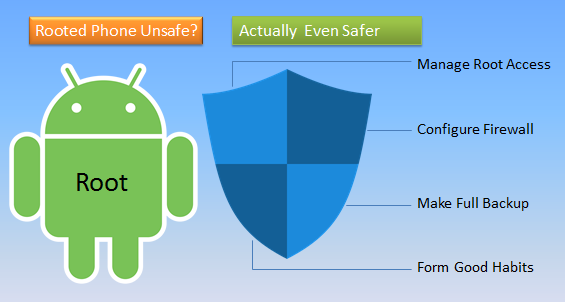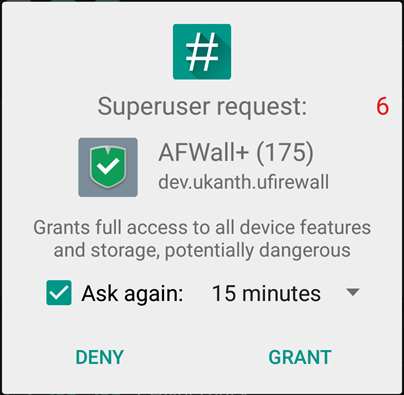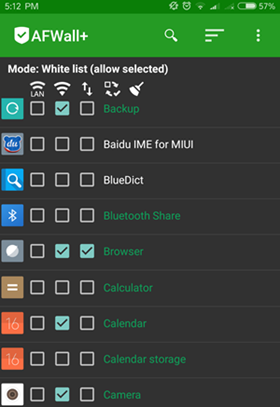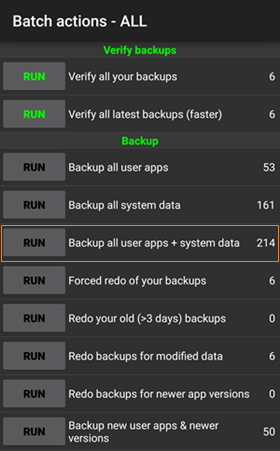A major concern, which makes many Android users hesitate to root their phones, is that the device may become unsafe after rooting. Even though it is actually not as horrible as people think, there are really some things you should know to keep Android phone safe after root. In many cases, fear comes from unknown. If we know it clearly, rooted Android phones can be even safer than originals. Here are some risks and security tips you need to learn to keep Android phone safe after root.

Risks for Rooted Android Device
To root an Android device is to get full access to it. This will unlock many advanced functions on Android, but also will expose the device to some threats. The main risks for rooted phone are from malware and wrong operations. Malware may attack your phone system, steal privacy, or even cause monetary loss. Wrong operations, like deleting system files, will brick your phone or cause boot loop.
How to Keep a Rooted Phone Secure
Rooted devices are indeed more vulnerable than original ones. Fortunately, there are some powerful security apps for rooted Android devices now. More importantly, the biggest security risk to Android is actually Android users and most of risks can be avoided by good habits. The following are security tips for rooted phone and tablet.
1. Manage root access carefully
With great power comes great responsibility. Administrator access can be used by good apps for advanced functions, but also can be used by malicious apps for evil purposes. Thankfully, super user access management tools can work as gatekeepers. SuperSU is one of the most powerful management software.
Every time one of your apps makes a request for root-level access to your smartphone’s OS, you’ll see a pop-up notification from SuperSU. And you’ll be able to allow or deny that app’s request. The permission-management process is easy. You can save the choices you make so you don’t have to repeat your selections each time an app goes to work. Don’t allow root access request from suspicious software.

2. Configure firewalling for rooted phone
To put it simply, a firewall is a software data barrier between a program or operating system and the outside network world. AFWall+ (Android Firewall +) is an excellent one of this kind of tools. With it, you can easily set up simple rules based on when you’re connected to LAN, WiFi network, 3G, or roaming, and these rules are by application, not universal. If you have to install an app but don’t trust it, just block all network accesses to it so that no privacy data would be leaked. Actually, AFWall+ has more advanced security functions, but internet access management is enough for newly rooted phones.

3. Backup all your phone data after root
Rooting your phone allows you to uninstall or delete bloatware or redundant files to make your phone run fast. However, if you are not familiar enough with Android OS, you might wrongly delete important system files, which could result in bricked phone or boot loop. Though most of these problems can be recovered, but your precious data will be likely wiped.
As one of the benefits of rooting, rooted phones can use Titanium to back up user apps, system data and all other data to external storage or cloud (Pro version). Once you set up your phone again or get a new phone, you can install this app and restore the data back.

4. Use your phone in good habits
Security is not an app. It’s a habit. Good habits can avoid most security problems on both unrooted and rooted Android phones. Extreme caution should be paid before installing any app.
* Only install apps from Google Play Store or Amazon if possible.
* Check app permissions carefully before and during installation.
* Don’t delete a file or uninstall an app unless you know clearly what it is.
* Turn off USB bugging when you don’t need it.
* Don’t click links sent from unknown sources.
Conclusion
Root access management tool can make your rooted phone at least as safe as unrooted phone. Firewall gives rooted phone an extra layer of protection. With an overall backup, you can enjoy your rooted phone with even fewer worries. But good habits are more important to keep a rooted phone secure. If there is a last suggestion, it should be that don’t get too obsessed with rooting.